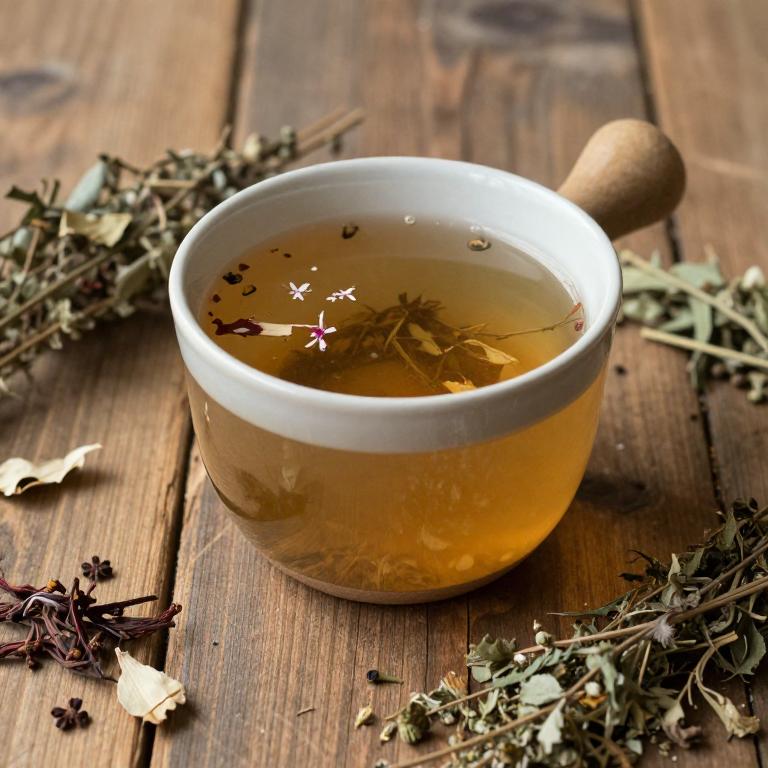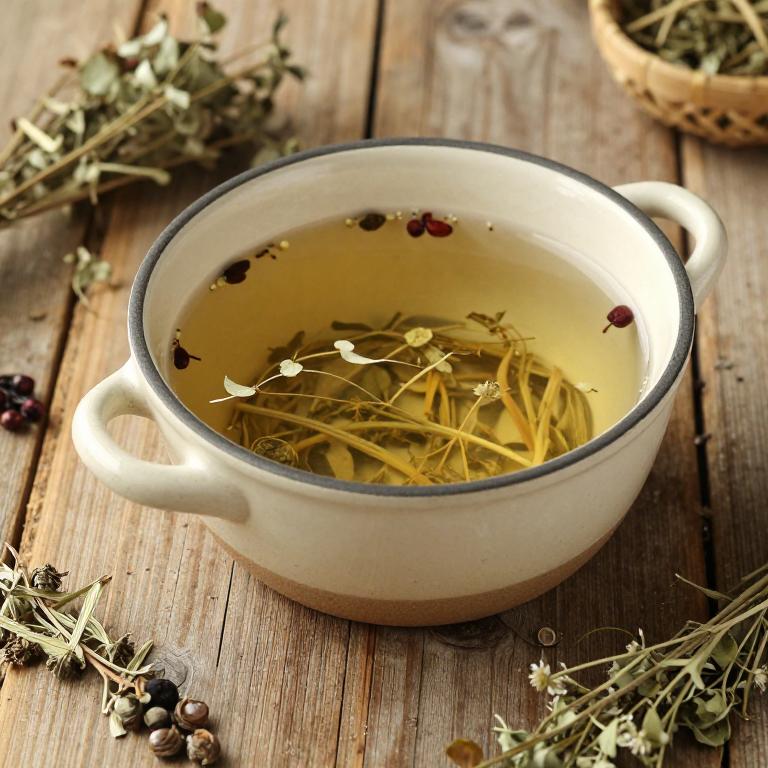10 Best Herbal Decoctions For Hay Fever

Herbal decoctions have been traditionally used to alleviate symptoms of hay fever, offering a natural alternative to conventional medications.
Common herbs such as nettle, echinacea, and butterbur are often included in these decoctions due to their anti-inflammatory and antihistamine properties. To prepare a decoction, dried herbs are boiled in water for an extended period, allowing the active compounds to be extracted into the liquid. This method is believed to support the immune system and reduce allergic reactions by soothing nasal passages and reducing mucus production.
While herbal decoctions may provide relief for some individuals, it is important to consult with a healthcare professional before use, especially for those with pre-existing conditions or who are taking other medications.
Table of Contents
- 1. Stinging nettle (Urtica dioica)
- 2. German chamomile (Chamomilla recutita)
- 3. Salvia (Salvia officinalis)
- 4. Field horsetail (Equisetum arvense)
- 5. Thyme (Thymus vulgaris)
- 6. Plantain (Plantago lanceolata)
- 7. St. john's wort (Hypericum perforatum)
- 8. Wormwood (Artemisia vulgaris)
- 9. Rosemary (Rosmarinus officinalis)
- 10. Yarrow (Achillea millefolium)
1. Stinging nettle (Urtica dioica)

Urtica dioica, commonly known as stinging nettle, has been traditionally used in herbal medicine for its potential to alleviate symptoms of hay fever.
When prepared as a decoction, the leaves and stems of Urtica dioica are simmered in water to extract their beneficial compounds, including histamine and various anti-inflammatory agents. This herbal decoction is believed to help reduce allergic reactions by modulating the immune system and decreasing histamine release. Some studies suggest that nettle may act as a natural antihistamine, making it a popular remedy for seasonal allergies.
However, it is important to consult with a qualified herbalist or healthcare provider before using Urtica dioica, as it can interact with certain medications and may cause side effects in some individuals.
2. German chamomile (Chamomilla recutita)

Chamomilla recutita, commonly known as German chamomile, has been traditionally used for its calming and anti-inflammatory properties.
Herbal decoctions made from its dried flowers are often prepared by steeping the flowers in hot water for several minutes, creating a soothing tea. These decoctions are believed to help alleviate symptoms of hay fever, such as nasal congestion and allergic rhinitis, due to their antihistaminic and anti-inflammatory effects. Some studies suggest that chamomile may reduce histamine release, which plays a key role in allergic reactions.
While more research is needed, many individuals find relief from hay fever symptoms through regular consumption of chamomilla recutita herbal decoctions.
3. Salvia (Salvia officinalis)

Salvia officinalis, commonly known as sage, has been traditionally used in herbal medicine for its potential benefits in alleviating symptoms of hay fever.
Herbal decoctions made from dried sage leaves are often prepared by simmering the plant material in water to extract its active compounds, such as flavonoids and volatile oils. These decoctions are believed to possess anti-inflammatory and antihistaminic properties, which may help reduce nasal congestion and allergic reactions associated with hay fever. Some studies suggest that sage may support immune function and reduce histamine release, though more research is needed to confirm its efficacy.
As a complementary therapy, sage decoctions can be used alongside conventional treatments under the guidance of a healthcare professional.
4. Field horsetail (Equisetum arvense)

Equisetum arvense, commonly known as field horsetail, has been traditionally used in herbal medicine for its potential benefits in alleviating symptoms of hay fever.
The plant contains high levels of silica and other bioactive compounds that may help reduce inflammation and support respiratory health. Herbal decoctions made from dried equisetum arvense are often prepared by simmering the plant material in water for several hours to extract its medicinal properties. These decoctions are typically consumed as a tea or taken in capsule form as a complementary therapy.
However, it is important to consult a healthcare professional before using equisetum arvense, as it may interact with certain medications and is not a substitute for conventional treatments.
5. Thyme (Thymus vulgaris)

Thymus vulgaris, commonly known as thyme, has been traditionally used in herbal medicine for its potent anti-inflammatory and antihistaminic properties, making it a potential remedy for hay fever symptoms.
Herbal decoctions of thymus vulgaris involve boiling the dried leaves and flowers in water to extract its active compounds, such as thymol and carvacrol, which are known for their immune-modulating effects. Some studies suggest that thyme may help reduce nasal congestion and allergic reactions by supporting the body's natural defenses against allergens. However, while anecdotal evidence supports its use, more clinical research is needed to confirm its efficacy and safety for hay fever treatment.
As with any herbal remedy, it is advisable to consult a healthcare professional before incorporating thymus vulgaris into a treatment regimen.
6. Plantain (Plantago lanceolata)

Plantago lanceolata, commonly known as broadleaf plantain, has been traditionally used in herbal medicine for its soothing and anti-inflammatory properties.
Herbal decoctions made from the leaves of this plant are often prepared by simmering the dried leaves in water to extract their active compounds. These decoctions are believed to support respiratory health and may help alleviate symptoms of hay fever, such as sneezing and nasal congestion. The plant contains mucilage, which can act as a natural demulcent, providing relief to irritated mucous membranes.
While some studies suggest potential benefits, it is important to consult a healthcare professional before using plantago lanceolata as a treatment for hay fever.
7. St. john's wort (Hypericum perforatum)

Hypericum perforatum, commonly known as St. John's Wort, has been traditionally used in herbal medicine for its potential anti-inflammatory and antihistaminic properties.
While it is more widely recognized for its use in treating mild depression, some studies suggest that its active compounds, such as hyperforin and hypericin, may help alleviate symptoms of hay fever by reducing allergic reactions. Herbal decoctions made from Hypericum perforatum are often prepared by simmering the dried plant material in water, allowing the active constituents to be extracted for consumption. These decoctions may provide a natural alternative for individuals seeking relief from seasonal allergies without the side effects of conventional antihistamines.
However, it is important to consult with a healthcare professional before using Hypericum perforatum, as it can interact with certain medications and may not be suitable for everyone.
8. Wormwood (Artemisia vulgaris)

Artemisia vulgaris, commonly known as wormwood, has been traditionally used in herbal medicine for its potential benefits in alleviating symptoms of hay fever.
Herbal decoctions made from the dried leaves and flowers of artemisia vulgaris are often prepared by simmering them in water for several minutes to extract their active compounds. These decoctions may help reduce inflammation and suppress allergic reactions due to the presence of compounds like thujone and flavonoids. However, it is important to note that artemisia vulgaris can be toxic in high doses and should be used with caution, especially during pregnancy or by individuals with certain medical conditions.
As with any herbal remedy, it is advisable to consult with a healthcare professional before incorporating artemisia vulgaris into a treatment plan for hay fever.
9. Rosemary (Rosmarinus officinalis)

Rosmarinus officinalis, commonly known as rosemary, has been traditionally used in herbal medicine for its potential benefits in alleviating symptoms of hay fever.
Herbal decoctions made from rosemary leaves are believed to help reduce inflammation and support respiratory health due to their high concentration of antioxidants and anti-inflammatory compounds. These decoctions can be prepared by simmering the dried leaves in water, creating a soothing tea that may help ease nasal congestion and allergic reactions. Some studies suggest that rosemary may help improve immune function and reduce histamine levels, which are often elevated in individuals with hay fever.
While rosemary decoctions are not a substitute for conventional treatments, they can serve as a complementary therapy when used under the guidance of a healthcare professional.
10. Yarrow (Achillea millefolium)

Achillea millefolium, commonly known as yarrow, has been traditionally used in herbal medicine for its potential to alleviate symptoms of hay fever.
Herbal decoctions made from the dried flowers and leaves of yarrow are believed to possess anti-inflammatory and antihistamine properties that may help reduce nasal congestion, sneezing, and runny nose associated with allergic rhinitis. These decoctions are typically prepared by simmering the plant material in water for several minutes, then allowing it to steep for an extended period to extract the active compounds. Some studies suggest that compounds in yarrow, such as chamazulene and essential oils, may support the body's natural response to allergens.
However, while yarrow may offer supportive benefits, it is important to consult a healthcare professional before using it as a treatment for hay fever, especially for those with known allergies or on medication.